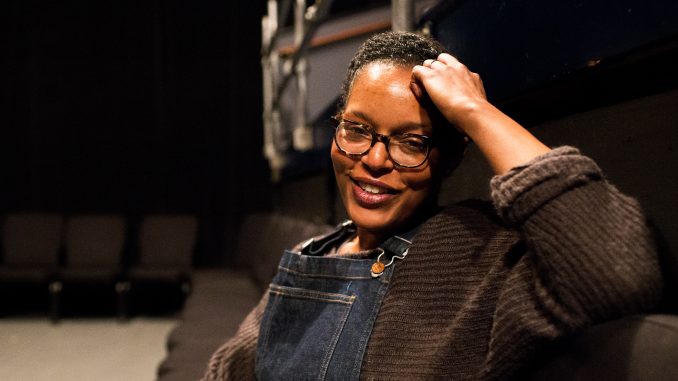
When Yolanda Wisher’s son was born six years ago, she started thinking about what would be left behind for him—trunks of journals, filled with poems that had never seen the light of day, or “something more substantial.”
Wisher chose the latter.
After about 15 years of “putting pen to paper,” the 2000 creative writing MFA graduate was recently named Philadelphia’s poet laureate. As the city’s third laureate, Wisher will participate in a variety of poetry events and use the medium as a vehicle for civic engagement.
“I want to demonstrate the art form,” Wisher told The Temple News last Wednesday. “People have a voice to be found. People really need that stuff to calibrate, sometimes, the trauma and the suffering and the pain of living.”
Some of Wisher’s other goals are to create new events, partner with organizations across the city and impact schools and the way poetry is involved in the curriculum.
Though Wisher recognizes there are many people in the city who love and appreciate poetry, she also wants to serve the people who “don’t already get it.”
“She’s always exploring another way to make poetry cool or relevant or cutting edge,” said Trapeta Mayson, a fellow poet and political science alumnus. “She’s going to want to really push to make poetry accessible.”
Wisher said she wants to “enhance, expand the definition of poetry and what poetry can do through my own example.”
Wisher’s own life would be an impressive example. From a young age, Wisher always had a talent for poetry, nurtured by her family and teachers. The first poem she ever wrote was a limerick in fourth grade—“the best homework ever,” she said. But when another student asked about getting the poems back, the class discovered their teacher had accidentally spilled coffee on the poems and thrown them out. Wisher said she felt “sheer disrespect and anger and rage” about the loss of her limerick.
But the experience also made her realize the poem was important, she said.
“That there was something deeper in the work for me,” Wisher said. “That was how I got started. Other teachers, my mother, started to recognize I had this talent for writing poems.”
But when it came time to attend college, Wisher felt she could only pick “one lane.” She picked the athletic one, playing basketball at Lafayette College, and chose a “substantial” major to “fall back on.”
“Because I always believed that myth that you need something besides poetry to fall back on,” Wisher said.
It wasn’t long before Wisher realized what a “terrible lane” it was for her. She quit basketball, losing the financial aid that allowed her to attend Lafayette. Wisher was afraid she would have to leave, but the English department stepped in, she said, giving her a work study job in Lafayette’s writing center.
A year after she quit the basketball team, the Nuyorican Poets came to Lafayette. Wisher remembers being “in awe of them,” thinking, “‘Wow, you can do that with poetry?’”
“And then it was like, ‘I can do that,’” she said.
The poetry group held a slam at the college. Wisher won.
“I was like, ‘Oh, s–t,’” she said. “This is real. It was confirmation that quitting the basketball team was a good decision.”
Before winning the slam, Wisher had never “really believed” in her work, she said. The slam encouraged her to take a leap into poetry. She starting thinking about graduate school for the first time, ultimately deciding on Temple, where she could learn from Sonia Sanchez, the first poet laureate of Philadelphia. She also studied with Jena Osman, an English professor.
“She was very community-oriented, very interested in figuring out ways poetry could circulate outside of a university setting, how poetry could function where she lived,” Osman said.
Wisher was so committed, Osman said, that she wasn’t sure how she could do poetry full-time and help the community. Instead, Wisher took a job as the art education director for the Mural Arts Program. But then Wisher was named a 2015 Pew Fellow.
“I think when she got the Pew, that’s what convinced her she could combine both things successfully and actually live,” Osman said. “That’s where she is now … how can she combine her love of language and the love of how language can actually communicate to people?”
Wisher hadn’t even gotten word of the Pew grant before quitting her job at Mural Arts—“it might have been smart to wait,” she said, but it just “didn’t matter anymore about the money.” Though she felt she was doing important work and adored her co-workers, Wisher started to worry she would be putting poetry on the side for the rest of her life.
Now, as poet laureate, that’s not so much a concern anymore.
“Just trust that when you do something you love, you’ll be supported and you can find a way to take care of yourself,” Wisher said. “It happened for me. I want to help other people figure that out.”
“I’m just always proud when my son says, ‘My mom’s a poet,’” she added.
Victoria Mier can be reached at victoria.mier@temple.edu.


Be the first to comment